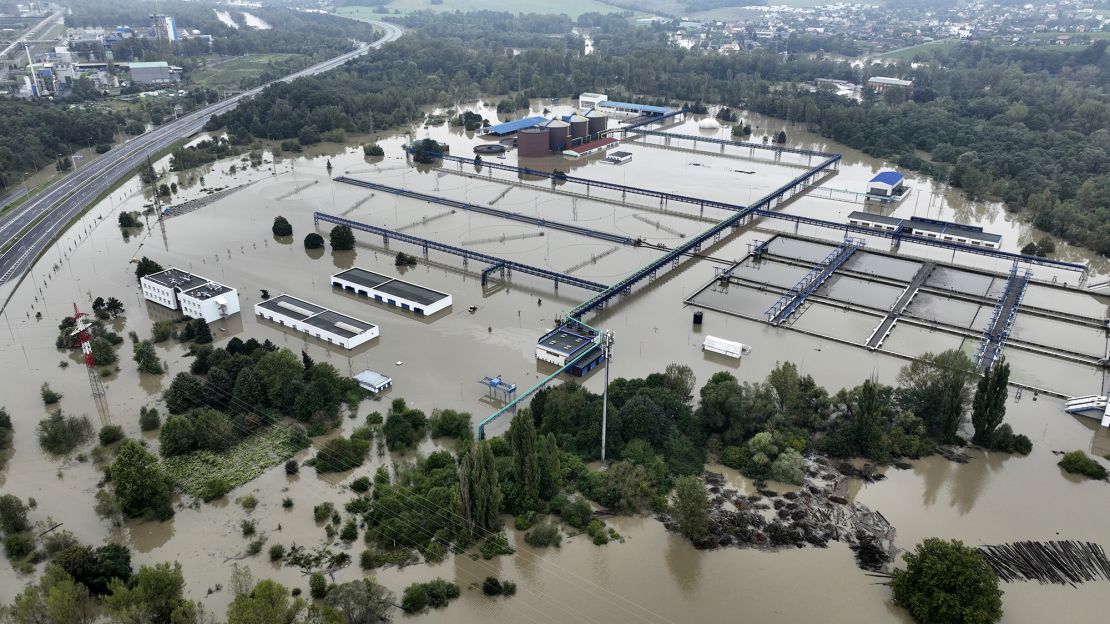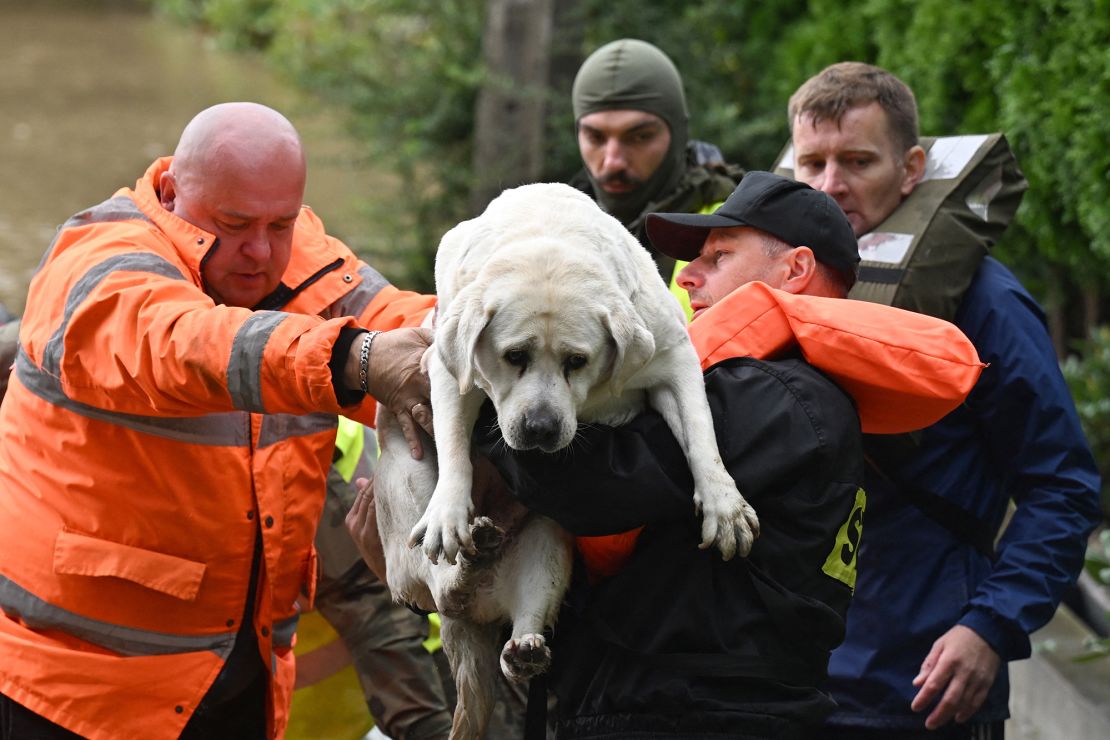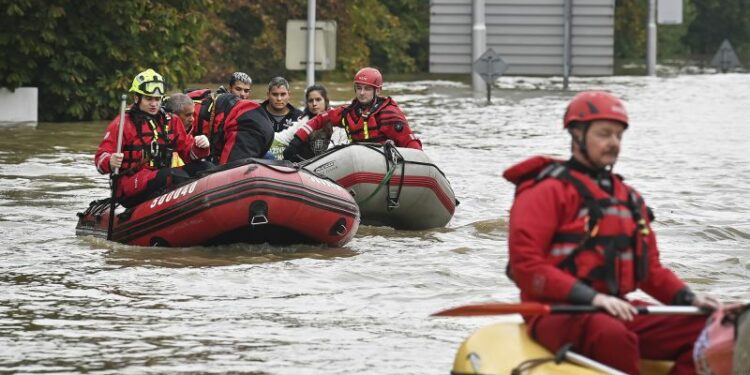At least 17 people have been killed in some of the worst floods to hit central Europe in decades as Storm Boris sweeps through the region, dumping well over a month’s worth of rain.
Austria, Poland, the Czech Republic and Hungary have all been hit with extreme rainfall. The Polish government declared a state of emergency after days of rain devastated swathes of the country’s southwestern regions. Prime Minister Donald Tusk announced $260 million (1 billion zloty) in emergency aid for the hardest hit regions on Monday, Polish national news agency PAP reported.
Across the border in the Czech Republic, thousands of residents have been left without hot water and electricity after authorities shuttered heating plants. In the city of Ostrava, which lies 15 kilometers (9 miles) from the Polish border, the Veolia heating plant was forced to shut down entirely because of the flooding, leaving the city’s 280,000 residents without hot water, according to CNN affiliate CNN Prima.
Over the past few days, seven died in Romania. In Austria, a firefighter was killed on Sunday and two men aged 70 and 80 were found dead by emergency services after being trapped in their homes on Monday, a spokesperson for the state government of Lower Austria told CNN.
Four people died as a result of floods in Poland, and in the Czech Republic three have died, local police said.
“We are still under immense pressure, as the situation remains highly critical,” Lower Austria governor Johanna Mikl-Leitner told a press conference, stressing that the region is “still in a state of crisis.”
Europe is the world’s fastest-warming continent and global heating is fueling extreme weather events there. A warmer atmosphere can hold more water vapor, meaning more intense rain when it falls, and hotter oceans whip up stronger storms.
In the Polish city of Nysa, residents were struggling to protect their homes from surging waters once again Monday. Patients from a local hospital, including pregnant women, had to be evacuated Monday after the city’s governor said the facility was no longer able to function properly, CNN affiliate TVN24 reported.
Dramatic aerial pictures also showed the town of Klodzko nearly entirely submerged under water with one of the town’s bridges entirely inaccessible. Floodwaters in the town are reaching as deep as 1.5 meters (5 feet), according to Polish national news agency PAP. After being called on to assist, the Polish army has now evacuated over 2,600 people from flood-stricken regions in the past 24 hours, Polish Defense Minister Wladyslaw Kosiniak-Kamysz said Monday, according to PAP.
Authorities are also alarmed by the situation in the Czech town of Litovlje, where 80% of buildings are submerged. The town’s mayor, Viktor Kohout, told CNN Prima that the Morava river is expected to crest at 2 p.m. local time (8 a.m. ET) on Monday.
In the hillside town of Jesenik, where residents are used to welcoming visitors to spa resorts, communities are managing dirty flood waters.


“There are many, many destroyed cars that were floating down to (the) street. Telephones are not working, there is no water, no electricity. So it is difficult,” one resident, Zdenek Kuzilek, told Reuters.
In Hungary, Prime Minister Viktor Orban has been trying to allay residents’ concerns in the capital of Budapest. In a video statement filmed along the western banks of the Danube River on Sunday, Orban said Hungarian water management experts were “confident” water levels wouldn’t exceed previous records.
“It will be difficult but we will be able to do it,” Orban said, promising that all the necessary resources have been deployed to deal with the rising flood waters.
Concern has been mounting in the Slovakian capital of Bratislava, where authorities were expecting the water level of the Danube River to peak sometime on Monday afternoon, the city’s spokesperson, Peter Bubla told CNN. “The situation remains very serious… The level of the Danube River in Bratislava has already exceeded nine meters (29 feet) and is still rising,” Bubla added.
Heavy rains have already caused “extensive damage” with teams hard at work to “remove uprooted and broken trees” after “hundreds” fell down in the city’s forest parks, according to Bubla. Police have also extensively “warned the public about the danger” of walking along the Danube riverside, a Bratislava Police spokesperson told CNN on Monday.
Poland is now set to call on the European Union for emergency financial assistance, Tusk said Monday. The bloc’s crisis management spokesperson, Balazs Ujvari had previously stressed that if called on, the EU would be “extremely quick” to send emergency aid such as water pumps, rescue teams, boats, food and water to countries in need.
Extreme rainfall events are likely to become more frequent and intense as the planet warms, science shows.
An analysis of a 2021 heavy rainfall event in Europe, in which more than 200 people were killed, found human-caused climate change had increased the likelihood and intensity of these events in the region. The World Weather Attribution initiative — a group of scientists who study extreme weather and published the analysis — concluded “these changes will continue in a rapidly warming climate.”
Source link : https://www.cnn.com/2024/09/16/weather/storm-boris-floods-europe-intl/index.html
Author :
Publish date : 2024-09-16 07:00:00
Copyright for syndicated content belongs to the linked Source.


